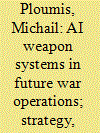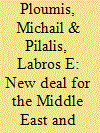|
|
|
Sort Order |
|
|
|
Items / Page
|
|
|
|
|
|
|
| Srl | Item |
| 1 |
ID:
188341


|
|
|
|
|
| Summary/Abstract |
In the future, at the strategic, operational and tactical level of warfare, the substitution of the human will and action by autonomous AI weapon systems appears quite probable. These systems are already being used and have the capability to successfully deal with threats faster than humans. The countering of AI weapon systems will pose a great challenge in a future war. In this article, the case is made that for the AI weapon systems to be defeated, unconventional cognition will be required.
|
|
|
|
|
|
|
|
|
|
|
|
|
|
|
|
| 2 |
ID:
170468


|
|
|
|
|
| Summary/Abstract |
Socio-economic factors have begun to upset the balance of military power between Greece and Turkey, a key defense strategy which Greece has relied upon to maintain peace with its neighbor. Provided that current trends continue, it is estimated that Greece will have difficulties in matching symmetric military Turkish threats in the near future. As such, the present article recommends a three-phase model to bring change in culture and doctrine within the Hellenic National Defense Forces, and thus aims to trigger innovative solutions that will allow Greece to confront Turkey’s extensive armament programs before the balance of power reverses in Turkey’s favor.
|
|
|
|
|
|
|
|
|
|
|
|
|
|
|
|
| 3 |
ID:
157992


|
|
|
|
|
| Summary/Abstract |
The modern Mission Command philosophy in military operations originated with the German concept of Auftragstaktik (mission tactics). It emphasizes in general terms the exercise of disciplined initiatives by subordinates during the execution of mission-type orders in the course of military operations that are conducted within the overall intent of a commander. The present paper contains an overview of the historical evolution of the mission command concept and its application. The paper compares the mission command concept with the detailed or linear method of command. This paper focuses on the relevance of the mission command concept for the Hellenic Land Forces (HLF) in Greece. The paper provides a historical account on when and where mission command was successfully exercised by the Hellenic Armed Forces in the modern military history of Greece. The authors support the premise that the mission command concept is essential for safeguarding Greek national security in the current environment of evolving symmetric and asymmetric threats, and in meeting operational challenges in a diverse and difficult terrain. The paper examines the cultural reasons that have impeded the adoption of the mission command concept within the HLF and recommends a three-phase model for its permanent implementation.
|
|
|
|
|
|
|
|
|
|
|
|
|
|
|
|
| 4 |
ID:
175680


|
|
|
|
|
| Summary/Abstract |
In an effort to strengthen the principal tenet of shared understanding in mission command, the following article advocates the selective teaching of philosophy be included in the training of military commanders. The article introduces a brief but relevant philosophical context, from Plato to Machiavelli, to distinguish both the potency of liberal education and its ability to develop shared understanding and trust between commanders. The evolving landscape of military operations in the Information Age entails a growing need for officers to think critically and act quickly, thus lending authority to the argument that philosophical understanding can eliminate potential shortcomings of otherwise inadequately implemented mission command.
|
|
|
|
|
|
|
|
|
|
|
|
|
|
|
|
| 5 |
ID:
146833


|
|
|
|
|
| Summary/Abstract |
Five years after the Arab uprisings in 2011, countries of the Middle East and North Africa (MENA) had difficulties finding their pathway to sustainable economic and political change. Arab oil-producing countries suffered from decreasing oil prices while the Arab non-oil-producing states struggled to provide better living conditions to their populations. Meanwhile, the war in Syria continued, the Islamic State (ISIS) was extending its efforts to establish a caliphate, and a massive influx of refugees was reaching Central Europe seeking asylum. In this context, it is imperative for Arab countries to establish substantial economic reforms in parallel with political change to enable their populations to remain in their homelands. The international community should support the MENA countries by introducing a “New Deal” to help lead to sustainable development and political change.
|
|
|
|
|
|
|
|
|
|
|
|
|
|
|
|
| 6 |
ID:
193525


|
|
|
|
|
| Summary/Abstract |
War technology, as it was tested in the War of Nagorno-Karabakh (2020), demonstrates that future large-scale ground combat in a symmetric theater of war will be planned and commanded in a centralized manner, while firing from modern weapon systems will play the role of force multiplier. Deception, flanking and envelopment tactics, as they were implemented by Napoleon the Great, are expected to reemerge in order to defeat a potential enemy in a world characterized by the Great Power competition. In this context, the necessity for leaderships which will simultaneously operate throughout the levels of warfare (strategic, operational and tactical) becomes apparent. At the same time, the protection and survival of the landpower in the areas of dispersion, the capacity for rapid advancement of the combative formations to the decisive point of engagement and their capability to apply flanking and envelopment tactics, will decide the victor of a potential war.
|
|
|
|
|
|
|
|
|
|
|
|
|
|
|
|
| 7 |
ID:
177565


|
|
|
|
|
| Summary/Abstract |
On the occasion of the anniversary of 2.500 years since the culmination of the Greco-Persian Wars (499-449 BC), the article attemps to showcase the concurrence of the strategy implemented at the Battle of Marathon (490 BC) by the Greek General Miltiades and the maxims of war established by the great Chinese General and philosopher Sun Tzu (544-496 BC). The aforemontioned battle is selected as a paradigm of the military history of the western world, demonstrating the implementation of the axioms of the great theoritician and practitioner of war. It attempts on overview of bibliography on strategy and more specifically on the precepts of Sun Tzu. It gives a brief account of the planning and conduct of the battle and makes an analysis of their concurrence with the teaching and principles of the Chinese philosopher.
|
|
|
|
|
|
|
|
|
|
|
|
|
|
|
|
|
|
|
|
|